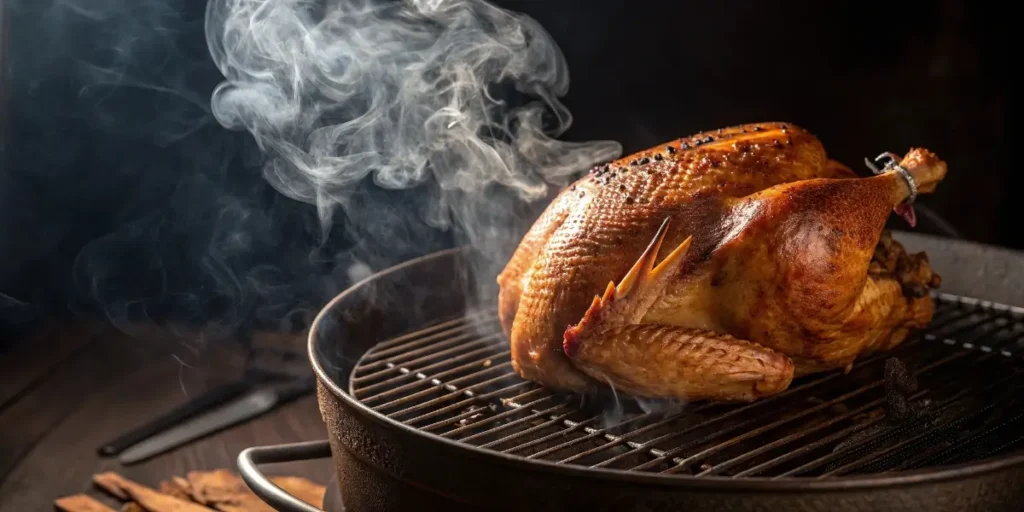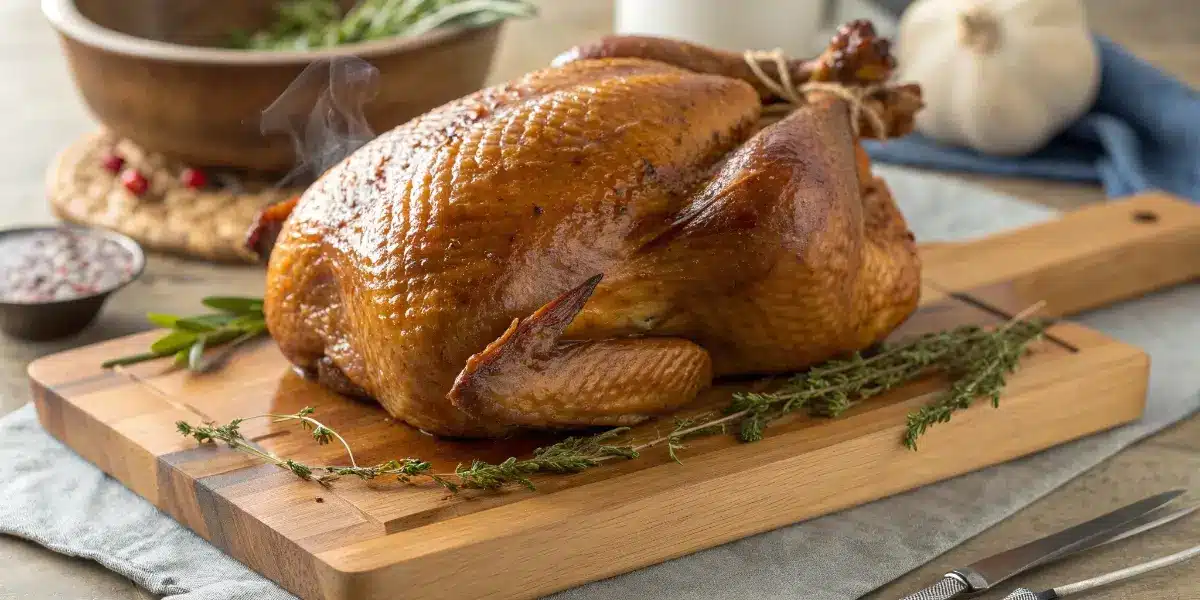The Ultimate Turkey Brine Recipe for Smoking: Flavor, Moisture & Perfection
Smoking a turkey is an art—slow, flavorful, and deeply satisfying. But even the most seasoned smoker knows the secret to juicy, tender meat lies in one essential step: brining. A proper turkey brine recipe for smoking infuses deep flavor, ensures moisture retention, and transforms an ordinary bird into something extraordinary. In this guide, we’ll cover everything from the science of brining to step-by-step instructions, the best ratios, and expert tips to achieve that perfect smoky tenderness.
Don’t miss our delicious smoked salmon brine recipe for more brining inspiration.
Table of Contents
Understanding the Purpose of a Turkey Brine for Smoking
What Is a Brine and Why It Works for Smoked Turkey
At its core, brining is the process of soaking meat in a solution of water, salt, and often sugar or aromatics. The salt breaks down muscle proteins, allowing moisture and flavor to penetrate deep into the turkey. When the turkey hits the smoker, this process locks in juices, ensuring the meat stays moist even after hours of low-and-slow cooking.
Unlike dry roasting, where meat can easily dry out, brining helps counter the dehydration that happens during smoking. The result? Juicier slices, richer flavor, and a bird that practically melts in your mouth.
Learn more about pot roast seasoning blends to enhance your cooking game with flavorful marinades.
How Brining Enhances Flavor and Texture During Smoking
Beyond juiciness, brining enhances texture and flavor in multiple ways. Salt modifies muscle fibers, creating a smoother texture while sugar adds mild sweetness and promotes browning. When combined with ingredients like garlic, citrus, bay leaves, or peppercorns, you introduce layers of flavor that elevate the turkey’s taste.
Smoking after brining adds another depth — the smoke adheres better to a moist surface, resulting in that signature rich, golden crust and aromatic bite. For an extra smoky-sweet balance, pair your brined turkey with a side like delicious spiced Cajun turkey recipe.
The Basic Brine Formula for Smoked Turkey
Essential Ingredients in a Turkey Brine Recipe for Smoking
A well-balanced turkey brine recipe for smoking doesn’t need to be complicated. The foundation is salt and water, but the flavor magic comes from sugar and aromatics. The salt penetrates deep into the meat fibers, seasoning from the inside out and locking in moisture during smoking. Sugar softens the harshness of salt and aids in that golden-brown finish on the skin.

Here’s a dependable formula for a 12–14 lb turkey:
| Ingredient | Quantity |
|---|---|
| Water | 1 gallon |
| Kosher salt | 1 cup |
| Brown sugar | ½ cup |
| Garlic cloves (crushed) | 5 |
| Fresh herbs (rosemary, thyme, sage) | 2–3 sprigs each |
| Whole peppercorns | 1 tablespoon |
| Optional: Apple cider or citrus slices | 1 cup / 2–3 slices |
You can experiment with aromatics like cloves, cinnamon sticks, or juniper berries for deeper holiday notes. Just remember to let the brine cool fully before immersing your turkey—warm brine can partially cook the surface.
Discover great ideas like pink Tibetan salt guide to learn how salt quality affects flavor and texture.
Balancing Salt, Sugar, and Aromatics for Perfect Flavor
Achieving the right balance in your brine ensures every bite is flavorful without being too salty. A good starting ratio is 1 cup kosher salt per gallon of water, paired with half as much sugar. For additional depth, substitute part of the water with apple juice, vegetable broth, or white wine.
If you’re after a subtle sweetness and caramelized skin, brown sugar works wonders. For an herby, woodsy note, add bay leaves, thyme, or rosemary. Once the turkey is submerged, cover and refrigerate it for 12–24 hours depending on size.
Check out this delicious smoked salmon brine recipe for inspiration on seasoning ratios.
Choosing Between Wet Brine and Dry Brine Methods
Differences Between Wet and Dry Brining for Smoked Turkey
When it comes to brining a turkey for the smoker, there are two main techniques—wet brining and dry brining. Both work well, but they produce slightly different textures and flavors. Wet brining involves fully submerging the bird in a seasoned liquid mixture of salt, sugar, and aromatics. It’s excellent for keeping the turkey exceptionally juicy, especially during long smoking sessions.
Dry brining, on the other hand, skips the liquid. You simply rub the turkey with a salt mixture and let it rest uncovered in the refrigerator. The salt draws out moisture, which then reabsorbs, seasoning the meat naturally while drying the skin for better crisping during smoking.
If your smoker tends to run hot or you’re aiming for an especially crispy skin, dry brining may be your best option. Wet brining remains ideal if you prefer traditional tenderness and deep flavor infusion.
Learn more about smoked flavor profiles with this smoked trout recipe that uses similar smoking principles.
When to Use Each Brining Method for the Best Results
Deciding between wet and dry brining depends on your goals, time, and available space. For large turkeys, wet brining requires a substantial container and refrigerator space. It’s great when you have time to prepare 24 hours ahead.
Dry brining is quicker, less messy, and ideal for smaller turkeys or tight spaces. It’s also perfect if you prefer crisper skin and slightly stronger seasoning. If you’re hosting Thanksgiving or a family gathering, you can start a dry brine two days before smoking for maximum flavor.
For extra insight, check out smoked chuck roast recipe—it showcases how brining or seasoning techniques adapt beautifully to other smoked meats.
Step-by-Step Turkey Brine Recipe for Smoking
Exact Measurements and Timing for the Best Brine
Crafting a flawless turkey brine recipe for smoking begins with precision. For a medium bird (12–14 pounds), use the following base formula for consistent results:
| Ingredient | Amount |
|---|---|
| Water | 1 gallon |
| Kosher salt | 1 cup |
| Brown sugar | ½ cup |
| Garlic (smashed) | 5 cloves |
| Bay leaves | 3 |
| Black peppercorns | 1 tablespoon |
| Fresh thyme & rosemary | 2 sprigs each |
| Optional: Apple juice or broth | 1 cup |
Step 1: In a large pot, combine water, salt, and sugar. Stir and heat gently until both dissolve.
Step 2: Add herbs, spices, and aromatics. Allow the mixture to cool completely.
Step 3: Submerge the turkey, ensuring it’s fully covered. If needed, weigh it down with a plate.
Step 4: Refrigerate for 12–24 hours, depending on bird size. Turn the turkey halfway through for even soaking.
If you prefer a sweeter, more complex flavor, swap the water for a mix of apple juice and orange peel. For a more savory tone, include soy sauce, garlic, and black tea.
Discover great ideas like delicious smoked salmon brine recipe to refine your ratios and create new variations.
Detailed Steps: Preparing and Submerging the Turkey
Once your brine has cooled, rinse your turkey under cold water and remove the giblets. Place it breast-side down in a food-safe bucket or brining bag. Pour in the cooled brine until the bird is fully submerged. Cover and refrigerate at 36–40°F to maintain food safety.
After the brining time ends, remove the turkey and rinse off the excess salt solution. Pat it dry with paper towels to prep for smoking. A good brine not only seasons but also primes the bird for even smoke absorption and golden skin.
Looking for inspiration? Try smoked chicken drumsticks for smaller-scale smoking practice, or check out king salmon recipe for a seafood twist using similar techniques.
How Long to Brine a Turkey Before Smoking
Brining Time by Turkey Weight (Table Included)
Timing is the secret weapon in any turkey brine recipe for smoking. Brine too short, and the seasoning won’t penetrate; too long, and the meat may turn mushy or overly salty. The sweet spot depends on your turkey’s weight and whether you’re using a wet or dry brine.
Here’s a helpful brining time chart:
| Turkey Weight | Wet Brine Time | Dry Brine Time |
|---|---|---|
| 8–10 lbs | 8–12 hours | 12–18 hours |
| 10–12 lbs | 12–18 hours | 18–24 hours |
| 12–14 lbs | 18–24 hours | 24–36 hours |
| 14–18 lbs | 24–36 hours | 36–48 hours |
| 18–20 lbs | 36–48 hours | 48–60 hours |
Keep your turkey in the refrigerator during the entire brining period to ensure food safety. If your fridge space is limited, a cooler filled with ice water works perfectly—just monitor the temperature to keep it below 40°F.
For the best flavor, avoid rushing. The longer (within limits) you brine, the deeper the seasoning seeps into the turkey. Learn more about brining and preservation balance from our pink Tibetan salt guide.
Signs Your Turkey Is Properly Brined
Not sure if your turkey’s ready for smoking? Here’s how to tell:
- The meat feels firm and springy, not soggy.
- The skin has a slightly tacky texture after rinsing and drying.
- The turkey carries a mild, seasoned aroma—not overly salty.
If the surface looks overly wet or pale, it may have soaked too long. A quick rinse and short air-dry in the fridge can help fix this before smoking.
Check out our delicious spiced Cajun turkey recipe for more expert timing and prep tips, or get creative with flavor by exploring delicious-moroccan-chicken-tagine for aromatic seasoning inspiration.
Drying and Preparing the Turkey After Brining

How Long Should You Dry Brine a Turkey Before Smoking
Once the brining process is complete, drying the turkey properly is essential for achieving crisp, golden skin and perfect smoke adherence. Whether you used a wet or dry brine, this step locks in flavor and texture. After removing the turkey from the brine, rinse it gently with cold water to remove any excess salt. Then, pat it dry thoroughly with paper towels.
For best results, place the turkey uncovered on a wire rack set over a baking sheet and refrigerate it for at least 12 hours. This air-drying period allows the skin to dehydrate slightly, ensuring it crisps beautifully in the smoker. If you’re pressed for time, even a 4–6 hour rest helps.
Check out our smoked chicken drumsticks to see how drying impacts the skin texture on smaller cuts of meat before you move to a full turkey.
Air-Drying and Patting Techniques for Crisp Skin
Crispy turkey skin starts with proper air circulation. Always dry your turkey on a rack, not directly on a plate or tray, so air can move freely underneath. Avoid covering it with plastic wrap—this traps moisture and softens the skin.
Before smoking, lightly brush the turkey with oil or melted butter. This helps seasoning adhere and aids in browning. Many pitmasters also sprinkle a final dusting of seasoning or herbs right before smoking for that extra pop of flavor.
For more smoking and prep inspiration, learn from our smoked chuck roast recipe—it demonstrates how drying and surface prep enhance bark formation.
Smoking the Perfect Turkey After Brining
Setting the Smoker Temperature and Wood Choices
Now that your brined bird is perfectly prepped, it’s time for the main event — smoking. To ensure juicy, flavorful meat, consistency is key. The ideal smoker temperature for turkey is 225°F to 250°F. This slow and steady approach lets smoke permeate deeply without drying out the meat.
For a balanced, aromatic smoke flavor, go for apple, cherry, or pecan wood. These mild fruitwoods add a hint of sweetness without overpowering the brine’s herbs and spices. If you want a bolder taste, mix in a little hickory or oak. Keep the smoker lid closed as much as possible; every peek releases valuable heat and smoke.
Monitor your turkey’s internal temperature closely — aim for 165°F in the breast and 175°F in the thigh. A digital meat thermometer is your best friend here.

Learn more about balancing smoke and seasoning with our smoked trout recipe.
How to Maintain Juiciness While Achieving Smoky Flavor
The true test of a smoked turkey is keeping it juicy. Since your turkey brine recipe for smoking already locked in moisture, focus now on maintaining it. Use a drip pan filled with broth, apple juice, or even water beneath the turkey to create steam and regulate temperature.
Baste your turkey every 45 minutes using melted butter or a mix of butter and broth. This adds a glossy finish and enhances the brine’s flavors. Rotate the turkey halfway through smoking to ensure even cooking. Depending on the bird’s size, total smoking time ranges from 30 to 40 minutes per pound.
For extra tenderness, let your smoked turkey rest for 30–45 minutes before carving. This allows juices to redistribute evenly. Don’t miss our delicious spiced Cajun turkey recipe to explore seasoning variations, or try pairing it with sides like roasted butternut squash recipe for a complete smoked feast.
Common Mistakes When Brining Turkey
Over-Brining and Oversalting: How to Avoid Them
Even the most experienced cooks can make missteps with a turkey brine recipe for smoking, and one of the most common is over-brining. While brining adds flavor and tenderness, leaving the turkey submerged too long can cause the meat to become overly salty or mushy.
To avoid this, follow a strict timeline based on the bird’s weight — generally, 12 to 24 hours for a medium-sized turkey. Always rinse the turkey thoroughly after brining and pat it dry to remove any surface salt before smoking. If you accidentally leave it in the brine too long, soaking it in cold water for an hour can help draw out excess salt.
Another common issue is using iodized table salt. Always stick to kosher salt or sea salt, which dissolve cleanly and provide consistent salinity. Check out our pink Tibetan salt guide to learn why salt quality dramatically impacts the final flavor and texture of smoked turkey.
Skipping Resting Time and Other Rookie Errors
Rushing the process is another pitfall that can ruin a beautifully brined turkey. After removing it from the brine, the turkey should rest uncovered in the refrigerator for at least 8 to 12 hours. This air-drying phase ensures crispy skin and a well-balanced flavor profile.
Many beginners also make the mistake of not cooling their brine before immersing the bird. Always chill the brine to avoid partially cooking the turkey before it even hits the smoker. Similarly, don’t overcrowd your smoker — air circulation is key to even smoke distribution.
For other smoking do’s and don’ts, learn from our smoked chuck roast recipe. If you’re exploring flavor balance, try the delicious smoked salmon brine recipe to experiment with different salt-to-sugar ratios on a smaller scale before applying it to a full turkey.
Is Brining a Turkey Really Worth It?
Comparing Brined vs. Unbrined Smoked Turkey
So, after all the prep, soaking, and patience — is brining really worth the effort? Absolutely. A properly executed turkey brine recipe for smoking guarantees tender, flavorful, and juicy results that can’t be achieved through seasoning alone. Brining changes the structure of the meat, allowing it to retain more moisture during the long smoking process.
When comparing a brined turkey to an unbrined one, the difference is immediately noticeable. Brined turkey slices stay moist even hours after cooking, while unbrined versions often dry out near the breast. The flavor also penetrates more evenly, making every bite seasoned rather than just the skin.
If you enjoy flavorful, melt-in-your-mouth meat, brining is non-negotiable. Don’t miss our smoked trout recipe for another excellent example of how brining transforms texture and taste across different proteins.
Expert Tips for Getting the Most Out of Brining
For best results, use filtered or distilled water in your brine. This ensures minerals in tap water don’t alter the salt balance. Always cool the brine completely before use, and choose a container that keeps the turkey fully submerged without overflow.
Experimenting with flavor profiles is another way to level up your smoked turkey. Try swapping brown sugar for maple syrup, or adding citrus zest, bourbon, or juniper berries for depth. Keep your ratios consistent, but don’t be afraid to make it your own.
Finally, remember that patience is the secret ingredient. Brining, drying, and slow-smoking all work together to create that perfect balance of smoke, salt, and tenderness. For further smoking inspiration, explore our carnivore recipes or check out delicious spiced Cajun turkey recipe to experiment with post-brine seasonings that take your turkey to the next level.
Conclusion
Mastering a turkey brine recipe for smoking isn’t about complexity—it’s about balance, patience, and precision. From the first soak to the final puff of smoke, every step builds toward one goal: a juicy, flavorful, perfectly smoked turkey that steals the show. Whether you prefer a classic wet brine or a quick dry brine, this process ensures that your holiday bird turns out restaurant-quality every single time.
Don’t miss our delicious smoked salmon brine recipe.
FAQs
What is a good brine to smoke a turkey?
A good turkey brine recipe for smoking combines salt, sugar, herbs, and aromatics in balanced proportions. The classic formula is 1 cup kosher salt + ½ cup brown sugar per gallon of water, plus garlic, bay leaves, peppercorns, and herbs like rosemary or thyme. You can also substitute part of the water with apple cider or broth for more depth.
What is the basic formula for brine?
The base ratio for any brine is 1 part salt to 2 parts sugar to 16 parts water. This balance seasons the meat while maintaining tenderness and juiciness. Always use kosher or sea salt—avoid iodized table salt, which can make the brine taste metallic.
How long should you dry brine a turkey before smoking?
For dry brining, rub the turkey generously with salt and refrigerate it uncovered for 24 to 48 hours. This allows the salt to penetrate and the skin to dry out, creating the perfect foundation for crisp, smoky results.
How long should I brine a turkey?
For a wet brine, submerge the turkey for 12 to 24 hours depending on its size. Larger birds (over 18 lbs) may benefit from up to 36 hours. Always keep the turkey cold (below 40°F) during the brining period.
What are common mistakes when brining?
The biggest mistakes are using too much salt, skipping the rinsing step, and not chilling the brine. Over-brining can make the meat mushy, while hot brine can partially cook the turkey before smoking. Always let your brine cool before adding the bird.
Is brining turkey really worth it?
Yes — brining dramatically improves moisture retention and flavor. The difference between brined and unbrined turkey is like night and day: one is succulent and seasoned throughout, the other often bland and dry. It’s the single step that guarantees success with smoked turkey.

